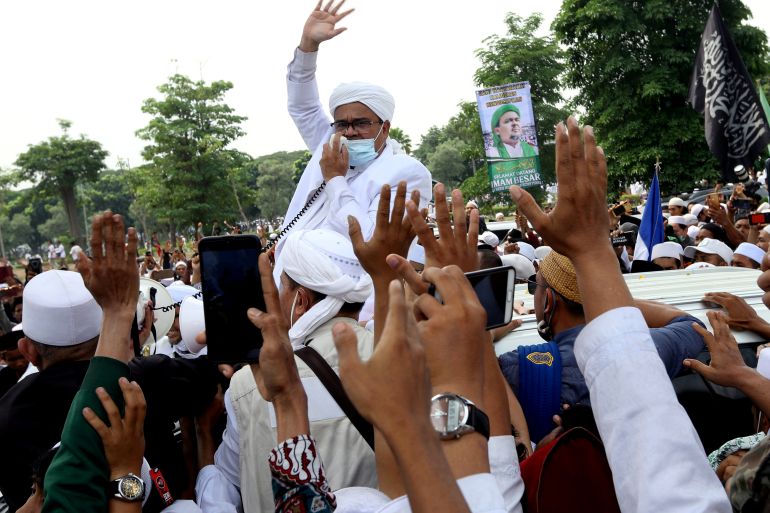Indonesian hardline Muslim leader held over lockdown breaches
Rizieq Shihab has called for a ‘moral revolution’ since arriving back home on Nov 10, fuelling tensions with the government.

Indonesian police held firebrand Muslim leader Rizieq Shihab for questioning on suspicion of breaching coronavirus restrictions by staging several mass gatherings since his return from self-exile last month.
The controversial and politically influential Muslim scholar has called for a “moral revolution” since arriving home on November 10, fuelling tension with President Joko Widodo’s administration in the world’s most populous Muslim-majority country.
Keep reading
list of 4 itemsIndonesia minister ‘took $1.2m in bribes in COVID-19 aid project’
COVID-19, political dynasties weigh as Indonesia heads to polls
Indonesia honours isolated COVID-19 patients’ right to vote
Rizieq’s arrest on Saturday came after six members of his Islamic Defender’s Front (FPI) were killed on Monday in a shoot-out with police investigating the violation of coronavirus protocols as COVID-19 cases and deaths surge.
Rizieq’s lawyer, Aziz Yanuar, who is also an FPI official, said the Muslim scholar was arrested after appearing at a police station in the capital Jakarta and that his team would file a motion to seek his release.
The national police said in a statement that Rizieq was being questioned on charges of suspected breaches of coronavirus restrictions and that investigators would decide whether he would be imprisoned.
Indonesia’s daily COVID-19 death toll hit a high of 175 on Friday, taking the total to nearly 19,000, with more than 611,000 confirmed infections.
Tens of thousands of his supporters greeted him on his return on November 10, many of them ignoring social distancing and other coronavirus protocols.
A health ministry official said 95 of the people who gathered at the airport had subsequently tested positive for COVID-19.
Nevertheless, human rights organisations say they are concerned there is more to this case than just health violations.
“We have an increasing concern about the increasing crackdown by the Indonesian government towards Islamists, or those perceived to be Islamist or radical Islam,” Usman Hamid of Amnesty International Indonesia told Al Jazeera.
“Those who are not aligned within the government meta-narrative of nationalism.”
‘Political problem’
Ian Wilson of Murdoch University in Perth, Australia, told Al Jazeera that there is concern over how the government manages this group as a “political problem”.
“The concern is … how they manage the perception that they are using other laws to repress a group for political reasons rather than the fact that they’ve broken the law,” he added.
With a reputation for raiding bars, brothels and violently cracking down on religious minorities, the FPI has gained political clout in the country of 270 million people during recent years.
The presidency made no immediate comment on Saturday’s arrest, but hours earlier the chief security minister, Mahfud MD, said on Twitter that the government “had no plans to reconcile” with Rizieq.
In 2016, Rizieq was the figurehead of a mass movement against Jakarta’s former Christian governor, who was jailed on blasphemy charges for insulting Islam.
Rizieq left the country a year later after facing charges – later dropped – over sending pornographic messages and insulting state ideology.